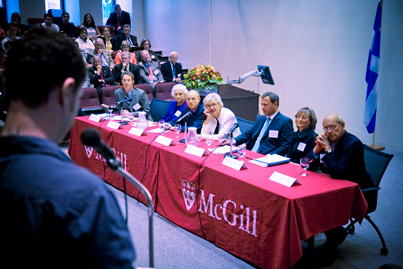Ladies and gentlemen, the Supremes
Ladies and gentlemen, the Supremes McGill University
User Tools (skip):
Ladies and gentlemen, the Supremes

LEFT TO RIGHT: Law Dean Nicholas Kasirer, former U.S. Justice Sandra Day O'Connor, Justice Stephen Breyer, Canadian Chief Justice Beverly McLachlan, U.S. Chief Justice John Roberts, Justice Marie Deschamps and Justice Marshall Rothstein during Sept. 25 Q & A session.
As the distinguished panel entered the Faculty of Law's Moot Court to meet with the first-year class, their faces were instantly recognizable to most in the crowd, yet something seemed amiss: the outfits were wrong. As the panelists found their chairs, the uncharacteristically relaxed smiles on those familiar faces suggested we were in for something special. There they were: Real. Unscripted. Robeless.
'They' are justices from the highest courts in Canada and the United States. Chief Justice of the Supreme Court of Canada Beverly McLachlin, having eschewed the traditional Santa Claus garb in favour of a classy off-white suit, was seated in the middle. Next to her sat John Roberts, Chief Justice of the Supreme Court of the United States, sporting a striking blue tie that would usually be barely visible beneath a very serious black robe. They were joined, on the Canadian side, by sitting Justices Marie Deschamps and Marshall Rothstein, and, on the American, by sitting Justice Stephen Breyer and retired Justice Sandra Day O'Connor.
It was nothing less than a once-in-a-lifetime opportunity for the law students, who packed the room to the walls. The most ambitious student, in her boldest legal fantasy, could not have expected to share a room with six Supreme Court Justices in the first month of the first year of law school.
In Montreal for a week-long legal exchange between Canada and the United States, sponsored by the American College of Trial Lawyers, the panel fielded questions from the audience in an open forum with students, a tradition of these exchanges. Law Dean Nicholas Kasirer, who moderated the event, emphasized what an opportunity it was to "understand judges as real people, with senses of humour and ways of expressing themselves that differ from the written word."
Any politicized statement was deftly avoided, but the justices did converse with the crowd informally, even candidly. Some students could probably recite excerpts of Justice O'Connor's landmark judgments, for instance, but statements such as, "I've been a working mother most of my life, and I can tell you it was very difficult. My babysitter moved to California—that was a disaster!" would be difficult to find in any written decision.
They were sharp, witty, intelligent—clearly worthy of the offices they hold. It was also nice to see that, as Justice Rothstein put it, "Judges are human beings, contrary to popular belief."
McGill Reporter contributor Pascal Zamprelli is himself a McGill Law '05 grad.

